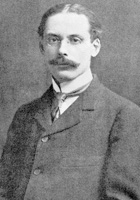Miniver Cheevy Poem by Edwin Arlington Robinson
Miniver Cheevy
Miniver Cheevy, child of scorn,
Grew lean while he assailed the seasons;
He wept that he was ever born,
And he had reasons.
Miniver loved the days of old
When swords were bright and steeds were prancing;
The vision of the warrior bold
Would set him dancing.
Miniver sighed for what was not,
And dreamed, and rested from his labors;
He dreamed of Thebes and Camelot,
And Priam's neighbors.
Miniver mourned the ripe renown
That made so many a name so fragrant;
He mourned Romance, now on the town,
And Art, a vagrant.
Mininver loved the Medici,
Albeit he had never seen one;
He would have sinned incessantly
Could he have been one.
Miniver cursed the commonplace
And eyed a khaki suit with loathing;
He missed the medieval grace
Of iron clothing.
Miniver scorned the gold he sought,
But sore annoyed was he without it;
Miniver thought, and thought, and thought,
And thought about it.
Miniver Cheevy, born too late,
Scratched his head and kept on thinking;
Miniver coughed, and called it fate,
And kept on drinking.
My father often recited this poem, but with variations. I remember this verse: Miniver Cheevy child of scorn “Cursed the day that he was born And he had reason” And also: (I forget the first line, but the verse ended...) “He only does it to annoy And could stop it if he pleased.” Does anyone know such a parody of this poem?
To live in the past; to live the world that isn't; to be deeply dissatisfied with one's lot in life to the extent that one misses his own life experience altogether, and then what there is to drown it in alcohol: such was Miner Cheevy's lot.
This poem has not been translated into any other language yet.
I would like to translate this poem
Miniver is a man who was born into the wrong times. He preferred the illustrious names and deeds of the past to the modern world. Miniver could be speaking for Robinson himself.